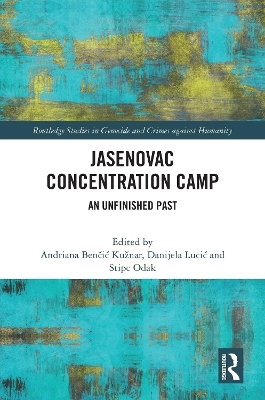
Jasenovac Concentration Camp
Routledge (Verlag)
978-1-032-35379-1 (ISBN)
This book presents state-of-the-art discussions around the concentration camp Jasenovac. Initially one of the largest camps of the Second World War, Jasenovac became a symbol of supra-national unity during the Yugoslav period and in the 1990s re-emerged as a contested symbol of narrational victimhood. By analyzing some of the most controversial topics related to the Second World War in south-eastern Europe – the Holocaust, the genocide of Serbs and Roma, the issues of political prisoners and state-sponsored crimes, censorship during Communist Yugoslavia, the use of memory in war propaganda, and representation of tragedies in museums and art – the book allows for a greater understanding of the development of intergroup violence in the former Yugoslavia. It will be of interest to scholars and students of history, genocide studies, memory studies, and sociology as well as professionals working in the field of conflict resolution and reconciliation.
Andriana Benčić Kužnar is an assistant professor of Military Sociology at the Faculty of Humanities and Social Sciences, University of Zagreb (Croatia). She published the book Memory of the Croatian War of Independence in 2020. Her research interest lies in the intersection of nationhood and identity with collective memories of war and political uses of the past. Danijela Lucić is an assistant professor of Military Sociology at the Faculty of Humanities and Social Sciences, University of Zagreb (Croatia). She published the book State Terrorism in 2019, and three co- authored books in the fields of war studies, security studies, and qualitative and quantitative research. Stipe Odak is a researcher and lecturer at the Université catholique de Louvain (Belgium). He received his PhD in Political and Social Sciences from UC Louvain and a doctorate in Theology from KU Leuven (Belgium). His research focuses on the intersections of memory, religion, and conflicts.
Part I: NAMING 1. Jasenovac Uses and Misuses of the Past: Manipulations and Historical Revisionism Surrounding the Biggest WWII Camp in the Balkans 2. The Road to ‘Serbian Yad Vashem’: Manipulations of the History of the Sajmište and Jasenovac Camps 3. Racial Laws in the Independent State of Croatia: Social and Legal Aspects 4. Crime and Punishment, or – What is the Connection between Jasenovac and Bleiburg? Biographical Excerpts on War Criminals from the Jasenovac Camp Part II: COUNTING 5. Jasenovac and Bleiburg between Facts and Manipulations 6. Jasenovac Concentration Camp and Its Role in the Destruction of the NDH People: Calculation of the Possible Number of Victims Based on the Partially Revised 1964 Census 7. Forgotten Victims of World War II: The Suffering of Roma in the Independent State of Croatia, 1941 – 1945 Part III: DESCRIBING 8. Contested Cultural Memory in Jasenovac: A Post–Communist/Post–Socialist Memorial Museum in an Era of Historical Revisionism 9. Jasenovac on Film: Manipulations of Identities and the Performance of Memory 10. The International Committee of the Red Cross and Camps on the Territory of the Independent State of Croatia with Special Review of the Jasenovac Concentration Camp
| Erscheinungsdatum | 05.04.2023 |
|---|---|
| Reihe/Serie | Routledge Studies in Genocide and Crimes against Humanity |
| Zusatzinfo | 19 Tables, black and white; 31 Line drawings, black and white; 31 Illustrations, black and white |
| Verlagsort | London |
| Sprache | englisch |
| Maße | 156 x 234 mm |
| Gewicht | 771 g |
| Themenwelt | Kunst / Musik / Theater |
| Reisen ► Reiseführer | |
| Geschichte ► Allgemeine Geschichte ► 1918 bis 1945 | |
| Geisteswissenschaften ► Geschichte ► Hilfswissenschaften | |
| Geisteswissenschaften ► Geschichte ► Regional- / Ländergeschichte | |
| Geschichte ► Teilgebiete der Geschichte ► Militärgeschichte | |
| Sozialwissenschaften ► Soziologie ► Spezielle Soziologien | |
| ISBN-10 | 1-032-35379-1 / 1032353791 |
| ISBN-13 | 978-1-032-35379-1 / 9781032353791 |
| Zustand | Neuware |
| Haben Sie eine Frage zum Produkt? |
aus dem Bereich


